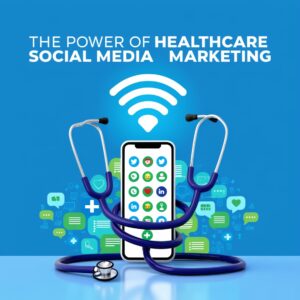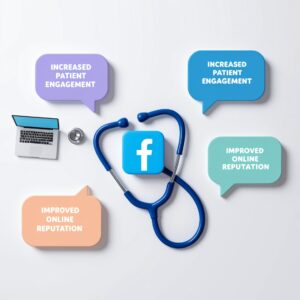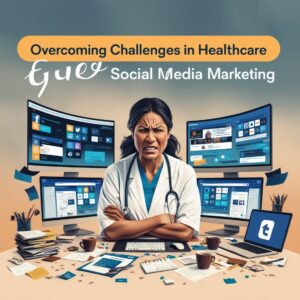In today’s digital age, social media has become an indispensable part of our daily lives. It’s not just for connecting with friends or following celebrities; it’s also a powerful tool for businesses across various industries. One sector that has increasingly turned to social media for growth is the healthcare industry. From attracting new patients to enhancing patient engagement, social media for healthcare is proving to be more than just a trend.
But is it truly important for your healthcare practice? Let’s take a deep dive into why social media has become such a crucial aspect of healthcare marketing and how healthcare social media marketing can benefit your practice.
The Importance of Social Media in Healthcare

Social media provides a direct line of communication between healthcare providers and their patients. It allows medical professionals to establish trust, promote services, and share health-related information. In fact, the importance of social media in healthcare cannot be overstated. Here’s why:
1. Increased Visibility and Reach
Social media platforms such as Facebook, Instagram, LinkedIn, and Twitter give healthcare providers the opportunity to reach a global audience. Whether your practice is in a small town or a big city, you can extend your reach beyond local boundaries. Regularly sharing valuable content about your practice, services, or health tips will keep your practice visible and accessible to a larger pool of potential patients.
Example:
“I’ve seen firsthand how social media has helped my practice grow. We’ve been able to reach so many more people than we could through traditional marketing.” – Dr. Sarah J., General Practitioner
2. Building Trust and Credibility
One of the most valuable assets you can build as a healthcare provider is trust. Patients are increasingly turning to social media to get information about their doctors, medical practices, and health conditions. By sharing helpful content, testimonials, reviews, and informative posts, you can show your audience that you are a trusted expert in your field.
3. Enhancing Patient Engagement
Patients expect a personalized experience, and social media offers the perfect platform to meet this need. By interacting with followers in real-time—responding to comments, liking posts, and answering questions—you demonstrate that you care about their concerns. This builds a stronger relationship with existing patients and makes your practice more appealing to potential patients.
4. Cost-Effective Marketing Strategy
Traditional marketing methods such as TV ads, billboards, and direct mail campaigns can be expensive and have limited reach. In contrast, social media marketing for healthcare is much more affordable and allows you to create targeted campaigns based on demographics, location, and interests. With a small budget, you can promote your practice to thousands of potential patients.
5. Patient Education
Social media is an excellent platform for educating patients about medical conditions, treatment options, and health-related news. You can use videos, infographics, blog posts, and live Q&A sessions to break down complex medical topics in simple terms. This not only positions your practice as a trusted authority but also empowers your patients to take charge of their health.
The Power of Healthcare Social Media Marketing

When we talk about social media for healthcare, it’s not just about having an account on Facebook or Instagram. Healthcare social media marketing is about creating a comprehensive strategy that aligns with your practice’s goals. This can include everything from content creation to advertising and community engagement. Let’s look at some of the most effective strategies for using social media in healthcare marketing:
1. Creating Valuable Content
The first rule of social media is to provide value. If you are just promoting your services without offering anything useful to your audience, you will likely be ignored. Healthcare providers can create content that resonates with their followers by:
- Sharing tips for maintaining a healthy lifestyle
- Explaining complex medical procedures in simple terms
- Sharing patient success stories and testimonials
- Posting answers to frequently asked questions (FAQs)
2. Targeted Advertising
One of the key advantages of social media marketing is the ability to run targeted ads. Platforms like Facebook and Instagram allow you to specify exactly who you want to reach, based on factors like age, gender, location, interests, and even behaviors. This means you can tailor your marketing to attract people who are more likely to need your services, increasing the chances of turning them into patients.
Example:
“Social media advertising has helped us get the word out about our new services. With targeted ads, we can reach people who are specifically searching for what we offer.” – Dr. John M., Dermatologist
3. Using Video for Engagement
Video content has proven to be one of the most engaging forms of content on social media. You can use video to:
- Share short health tips
- Walk patients through procedures
- Post behind-the-scenes tours of your office
- Highlight patient success stories
Videos not only help increase engagement but also make your practice feel more relatable and approachable.
4. Live Q&A and Webinars
Hosting live Q&A sessions or webinars is an excellent way to engage with your audience in real-time. This gives patients an opportunity to ask questions and learn more about their health concerns. By offering free advice or information through these sessions, you position yourself as an authority in your field while also increasing trust among your audience.
5. Managing Online Reputation
Online reviews play a critical role in the decision-making process of potential patients. Social media allows you to manage and respond to reviews, both positive and negative. By showing that you care about patient feedback and are willing to address any concerns, you can enhance your practice’s reputation and trustworthiness.
Key Benefits of Social Media for Healthcare Practices

Let’s recap some of the most significant benefits healthcare practices can experience from embracing social media marketing:
- Boosting patient acquisition: Social media platforms can help you attract new patients by expanding your reach and visibility.
- Strengthening patient retention: By maintaining regular communication with your patients, you can keep them informed and engaged, fostering loyalty.
- Improving patient satisfaction: Addressing patient concerns, offering valuable information, and creating an open communication channel enhances overall patient satisfaction.
- Increasing community involvement: You can use social media to participate in community events, health campaigns, or charity drives, which can further increase your practice’s exposure.
- Reputation management: Social media helps you manage your online reviews and maintain a positive reputation by addressing patient feedback promptly.
Overcoming Challenges in Healthcare Social Media Marketing

While social media offers many advantages, it is not without challenges, especially in the healthcare sector. Here are a few hurdles to consider and how to overcome them:
1. Compliance with HIPAA
Healthcare providers need to be cautious when sharing patient information on social media. The Health Insurance Portability and Accountability Act (HIPAA) regulates how healthcare organizations handle patient data. To avoid violating these regulations, ensure that you never share sensitive patient information without consent and that your posts adhere to HIPAA guidelines.
2. Managing Time and Resources
Social media management can be time-consuming, and for a busy healthcare practice, it might seem overwhelming. Hiring a social media manager or working with a digital marketing agency can help you stay on top of content creation, community management, and engagement.
3. Handling Negative Feedback
While social media can be a great way to build trust, it can also expose your practice to negative comments or reviews. Instead of ignoring negative feedback, take the opportunity to respond professionally, address concerns, and show your commitment to improving patient care.
Conclusion: Is Social Media Important for Your Healthcare Practice?
There’s no doubt that social media for healthcare is essential in today’s digital world. Whether you’re looking to expand your practice, connect with patients, or boost your marketing efforts, social media offers endless possibilities. By leveraging the power of social media, you can enhance your patient engagement, build a positive reputation, and ultimately grow your healthcare practice.
Remember, the importance of social media marketing lies in consistency and quality. Create valuable content, engage with your patients, and stay active across platforms to see long-term results. The key to success is not just being on social media but using it effectively to build meaningful relationships with your audience.
Final Thoughts:
Healthcare is a trust-based industry, and social media offers a unique opportunity to foster that trust. If you haven’t already, it’s time to start incorporating healthcare social media marketing into your overall strategy. The benefits far outweigh the challenges, and the future of healthcare marketing is digital. Stay ahead of the curve and start embracing social media today!
